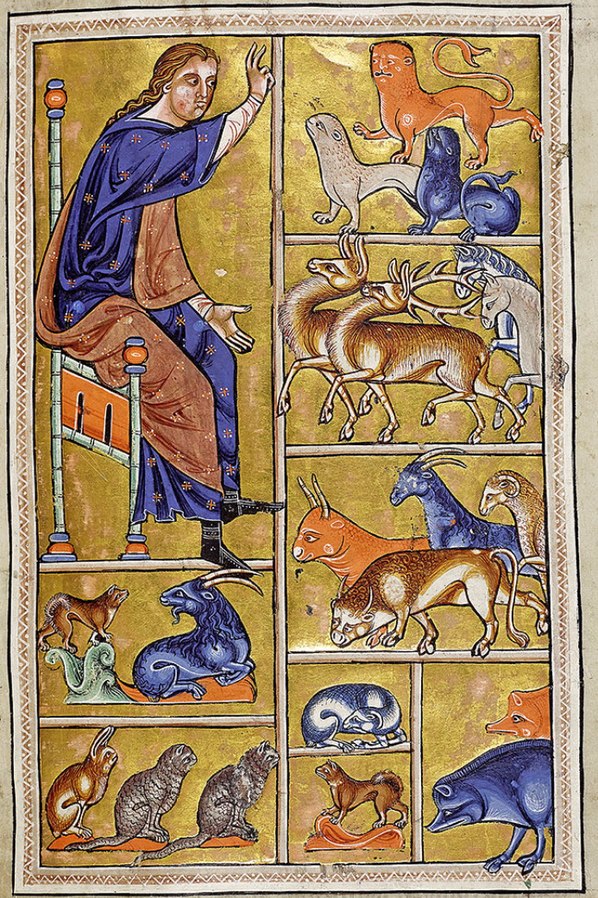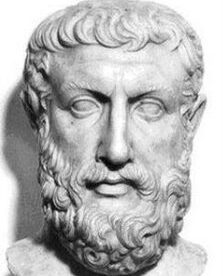
Adam naming the animals. Folio 5 from the Aberdeen Bestiary
Among the many institutions under attack in our time, it is perhaps the institution of language which evades the most attention. This is a dangerous oversight, for history and observation provide us with a thorough record of the powerful influence of this primordial mystery. Change a language, change the mentality of the people; rulers and their nations have understood this truth, whether utilized in the service of God or in the service of the Evil One. In his impressive work Essay on the Generative Principle of Political Constitutions and Other Human Institutions (which is a far more exciting read than it sounds) the brilliant Catholic philosopher Joseph de Maistre has left for us a fascinating theory of language which grants superb clarity on the matter.
In setting down his anthropology (understanding of man), Maistre tells us that:1
Man in relation to his Creator is sublime, and his action is creative: on the contrary, as soon as he separates from God and acts alone, he does not cease to be powerful, for this is a privilege of his nature, but his action is negative, and only destroys.
(34)
With this essential context, his approach to understanding the function and role of language can be elucidated. He writes that “every human language is learned and never invented”, and furthermore, “no imaginable hypothesis within the realm of human power can explain, with the slightest appearance of probability, either the formation or diversity of languages” (35). Even with the passage of over two hundred years, Maistre has not been proven wrong, nor ever will be. It is not as if men have not tried to discover the origin of language for themselves since then—no, quite on the contrary! But their propositions are like those of that “wheel of Asia” referenced by Chesterton; nonsensical and contradictory.
Even the evolutionists will assert that human language stands apart from animal communication. Apes lack the capacity for language, and no amount of sign language gorillas will ever change this. Such extraordinary examples as these are trained to make these motions in order to receive food or some other kind of reward from their handlers. Though such conditioning is complicated, the fact is—and all honest minds will admit it, even those of the scientific establishment—these gorillas have no understanding of what they are communicating. They can only imitate because they lack rational souls. Quite simply, these anthropomorphizing efforts are a circus act.
Yet, our alleged “common ancestors” with the apes are to have branched off somewhere around a presupposed two million years ago, and from there it is said that man (Homo sapiens) diverged from Homo erectus around 500,000 years ago. However, it is stated by the Darwinians that it took until around 150,000 to 80,000 years ago for men to “invent” language!2
Thus all of these long ages and the “ape-to-man” mythology are conveniently brought in to attempt to explain that which is humanly inexplicable.3 Men cannot truly create their own languages—how could they, given the intricacies of its aspects, such as grammar and vocabulary? Could even a group of geniuses, given a thousand years, develop an entirely new language like that of Latin, declensions and all?
Moreover, if we are to consider modern “invented” languages such as Tolkien’s Elvish or even that sad internationalist experiment called Esperanto in light of this passage, we must remark that these were never truly their own. They were artifice, imitations of actual, existing languages.
A crucial element of this theory is Maistre’s teaching on the significance of names. He writes that:
Names are by no means arbitrary, as so many men who have lost their names have said. God is called: I am; and every creature is called, I am that.
(37)
Further illustrating his point, he draws another example from Holy Writ, and then details others drawn from the realm of the Church and from that of the secular world:
Did He not say that in His future kingdom He would give the victors a NEW NAME, proportionate to their exploits? And have men, made in the image of God, found a more solemn way of rewarding conquerors than that of giving them a new name, the most honourable of all to the judgment of men, that of the vanquished nation? Whenever a man is supposed to have changed his life and received a new character, he is quite commonly given a new name. This can be seen in baptism, in confirmation, in the enlistment of soldiers, on entry into a religion, in the manumission of slaves, etc.; in a word, the name of every being expresses what it is, and in this there is nothing arbitrary.
(Ibid)
Names, and therefore language by extension, have objective meaning—contrary to the opinions of modern pseudo-philosophers. As can be inferred from these previous two excerpts, this objective value of names and language, as with all other aspects of His Creation, have their origin “more or less immediately in God” (38). Men, therefore, have a sort of limited power to name, and they ought to exercise this in humility. A prideful use of language becomes abusive. In observing how the enemies of God have given all sorts of new names to things in order to mask sin and demean virtue, such as “gender affirming care” in place of “genital mutilation” and “undocumented immigrant” in place of “illegal alien”, one can easily find examples of this abuse in our time. Maistre provides a law of naming which lays down the groundwork for his conception of “germination” and further elucidates his argument:
It is forbidden for man to give great names to things of which he is the author, and which he believes to be great; but if he has proceeded legitimately, the vulgar name of the thing will be ennobled by it and will become great.
(39)
“Never,” writes Maistre, “is the name proportionate to the thing; the thing always dignifies the name” (41). Like a caterpillar that is transformed by metamorphosis into a butterfly, or a seed that will one day blossom into a beautiful flower, names must start out from a lowly place, and if worthy, will one day germinate into something truly great. The author writes:
The name must germinate, so to speak, otherwise it is false. What does the word throne signify in its origin? Seat, or even stool [“escabelle”]. What does sceptre mean? A stick to lean on.
(Ibid)
Language, therefore, is organic and objective. It derives from man’s power to name as given to him by God through our first father, Adam, but this same power has become limited after the Fall. Names, forming the units of language, must be unassuming in their beginning if they will ever signify something noble or virtuous. The perversion of language by sinful men clouds meaning and introduces superficiality, and since there is so much of this today, men are more amendable to the idea that the whole thing is a “social construct”. Such a belief, of course, is precisely where the enemies of God want men to be entrapped in. For if, as they claim, language is ultimately subjective, then there is no barrier to stop politicians and academics from ruthlessly bastardizing it. But if men accept Maistre’s theory, then they must acknowledge their limits and humble themselves under the gentle yoke of Christ the King.
-
Maistre, Joseph de. Essay on the Generative Principle of Political Constitutions and Other Human Institutions. Translated by Edward Maxwell III. Maistre: Major Works, Volume I. Imperium Press. 2021.
-
Van Gelderen, Ely. A History of the English Language. Revised ed. John Benjamins Publishing Company. 2014. pp. 33-34.
- For a detailed refutation of the “ape-to-man” mythology, I recommend Evolution: The Challenge of the Fossil Record by Duane T. Gish, PhD. Though the book is now decades old at this point, it addresses many of the foundational problems of Evolutionism. In referencing the opinions of prominent Evolutionist scientists in tandem with his wonderful use of natural reason, the author proves that all examples of the alleged “ape-men” were in reality either apes or men.
